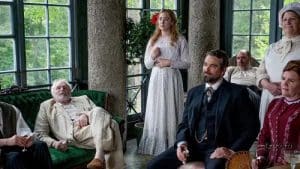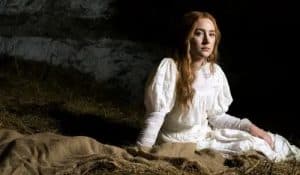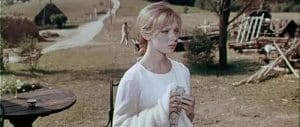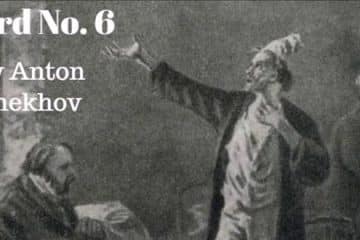Article menu:
- About the main milestones of the plot of Chekhov’s tragicomedy
- How is the plot tied?
- Personal dramas are on the rise
- Did the heroes have a choice?
- Problems of “Seagull”
- Characteristics of the key characters of the work
- The image of Arkadina
- Treplev’s image
- Nina’s image
- The image of Trigorin
- Image of Sorin
- Image of Dorn
- Polina’s image
- The image of Shamraev
- The image of Masha
- The image of Medvedenko
Chekhov’s “The Seagull” is considered a tragicomedy. However, the topics that the author
touches on in his work are quite serious. So, Chekhov writes – as usual – about love. Or rather, about a feeling
that completely captures a person. Before people, when it comes to such feelings, the question always arises: what
to choose, love or money, love or fame? The writer is trying to answer these questions, thinking about the need for
healthy egoism, about all-consuming and true love. Chekhov also talks about hopelessness, union, and, finally, the
sad end that often crowns relationships.
No wonder the critic Ignatov wrote that Chekhov knows how to infect the public with his
own moods and emotions. And this is best manifested in small genres and in the dramatic heritage of the writer. “The
Seagull” is perhaps the clearest example of such an “infection”. In this play, Chekhov shows all his suddenness,
plunging the reader into the maelstrom of drama even before getting to know the characters. Painful anxiety,
elevated nervousness – both the author and the viewer feel this weight. And the reader.
About the main milestones of the plot of Chekhov’s tragicomedy
In the center of the plot, the writer placed the feelings that Konstantin experienced
for Nina. The surrounding people believed that this couple felt reciprocity, and the feelings of the young man and
girl were real. Young people found common interests, both loved theater, and art. Also, the couple was related by
their position in society and parental blessing: the parents were not opposed to the children getting
married.

Konstantin enjoyed creating stories and plays. By the way, the hero’s plays often
resonated with the audience. The surname of Konstantin – Treplev – is very bright, which is called “speaking”. This
means many words, few actions. The main initiator of the action in this pair was Nina. The girl was sincerely fond
of creativity, loved the theater, and staged performances at home.
Critics call this relationship superficially idyllic for a reason. At some point, a
famous actress, Arkadina, invades the lives of Konstantin and Nina. Concurrently, Arkadina is the mother of
Konstantin. The actress is accompanied by a fan – Boris. The latter wrote fiction but lately feels tired of
literature. In addition, Boris doubts that society is fair to him: according to the hero, he has a modest talent.
Boris also has a “speaking” surname: Trigorin, that is, “three times grief”.
How is the plot tied?
Action one. Konstantin and Nina (who, by the way, also has a bright surname –
Zarechnaya, that is, remote from the world) were going to put on a performance. This is a miniature, part of one of
the plays. The performance turned out to be a little decadent, causing public outrage and more protest than
acceptance. Konstantin, angry, left. Nina, having stayed, listened to the opinion about the performance, as well as
compliments. The audience liked Zarechnaya’s game. Most of all, Boris liked the girl’s game. It is at this point
that the plot of the work is tied. Critics often say that different behavior of Boris could turn the course of
events in a completely different direction.
Boris’s compliments paid off: Nina began to like Trigorin. Zarechnaya is
annoyed by Konstantin, especially during meetings. As for Treplev, the hero believes that Nina does not
appreciate his work.
Desperate, Konstantin makes an unsuccessful suicide attempt. Now Treplev abandons plays
and switches to prose.
Personal dramas are on the rise
If Treplev is focused on himself, then Arkadina is well aware of what is happening. Not
wanting to lose Boris, the heroine wants to leave the estate as soon as possible. Of course, the actress is going to
take the gentleman with her. Saying goodbye, Zarechnaya gives Trigorin a medallion. This gift is a kind of
recognition of feelings. Boris would like to stay with Zarechnaya, but Arkadina convinces Trigorin to leave. The
actress inspires the man that thoughts about relations with Nina are empty and meaningless.
Some time passes. Nina travels to Moscow to continue her theatrical career there.
Zarechnaya had high skill and technique, but the girl had no talent. However, what is forbidden, is you always want
to get twice as strong. Therefore, Trigorin, having learned about Nina’s arrival in Moscow, persuades the girl into
a secret relationship. As a result, Nina gives birth to a weak child who dies almost immediately after birth. The
family turns away from Zarechnaya. Gradually, Boris loses interest in Nina and returns to his previous lover,
Arkadina.
The depth of the story “Letter” by Anton Pavlovich Chekhov is obvious. We
invite readers to familiarize themselves with the characteristics of the heroes of this work.
Konstantin, meanwhile, still loved Nina. The hero wanted Zarechnaya to return, despite
the girl’s past. However, Nina refused, falling in love with Boris even more. Zarechnaya is trying to build a career
as an actress, but the lack of talent does not allow Nina to successfully settle in the theater. A third-rate
actress, Nina responds to the harassment of rich people and various visitors to provincial performances. As a
result, Treplev was unable to recover from his break with Zarechnaya. Soon, Boris’s recklessness and Zarechnaya’s
servility made themselves felt: Konstantin commits suicide. The unfortunate Treplev could not endure the burden of
memories.
Did the heroes have a choice?
Of course. Nina’s charms turned out to be fatal for Konstantin. However, the man could
be happy. Next to Treplev lived a beautiful girl with a big and kind heart.

This girl did not expect a “seagull”, did not want to catch a “crane”, preferring a
“titmouse” in her hands. We are talking about Masha, the daughter of Shamraev (who was a lieutenant). Masha
sincerely loved Treplev, refusing to marry Medvedenko. And that school teacher, meanwhile, repeatedly offered the
girl a hand and a heart. Medvedenko, of course, is not rich, but morally high. Realizing that Konstantin will not
return her feelings, Masha nevertheless marries a teacher. Soon the couple has a child, but this does not bring the
spouse’s family well-being. Masha is looking for meetings with Konstantin, not stopping thinking about the
unrequited love of youth.
Those who suffered the least from this story are Arkadina and Boris. The
actress endured a turbulent and chaotic period in the life of a gentleman. And this wisdom bore fruit: Boris
gradually calmed down and came to Arkadina to repent and reconcile.
Irina Arkadina has both mind and life experience in reserve, so the woman forgave Boris.
Over time, the life of the couple returned to normal, to a monotonous and imposing rhythm.
What lessons should be learned from this rather tragic story? First, Treplev lacked
self-confidence. After all, then Nina would not have thrown herself into the arms of Boris, tempted by the literary
fame of the hero. Secondly, Masha should have appreciated Medvedenko more. Perhaps, in the end, true love would be
born in the relationship of the spouses. However, Masha preferred to cherish and cherish the past and her
unfulfilled dreams.
Problems of “Seagull”
This work is the fruit of Chekhov’s work in 1895 and 1896. After its publication and
first production, The Seagull became one of Chekhov’s most popular plays. Why? Obviously, because the writer
addresses topics and issues relevant to each person:
- Is the dream worth the ruined life and total sacrifices?
- What is the significance in human life of the first love, the feelings of adolescence?
- Is it possible to keep this love for life?
- Is it right to think about the mistakes of the past all your life?
- What should a person choose, what is more valuable: small happiness (“a tit in the hands”) or a big dream (“a crane in the sky”, “a seagull”)?
- Is it right to forgive treason and betrayal? Or should the traitor be permanently removed from your life?
So, in four acts, Chekhov reflects on the issues that one day all people face. Who has a
heart?
Characteristics of the key characters of the work
The image of Arkadina
The heroine’s name is Irina Nikolaevna. Arkadina is forty-three years old, a woman who
leads an active life as a socialite. This famous actress has a son. This is the same Treplev. The woman has no more
children. Arkadina and Boris are in an informal relationship. Boris, meanwhile, is much younger than his beloved
patroness. The pride of Arkadina is a beautiful and well-groomed appearance, as well as elegant clothes and good
taste.
Treplev’s image
The only child of Arkadina, Konstantin, was twenty-five years old. The young man’s
uncle’s name is Petr Nikolaevich Sorin. He is a retired official. In the province, in the estate of his uncle,
Treplev lives. The young man dreams of a writing career. It is worth saying, moreover, that Treplev is quite
talented. Konstantin has warm feelings for his mother but does not always agree with Irina in his views on life and
life position. These discrepancies sometimes cause quarrels between mother and son.
“Ward number 6” is one of the most famous works of the Russian classic
Anton Pavlovich Chekhov. We invite readers to read a summary of this work.
Konstantin loved a young beauty named Nina. It seems that the girl also loves the young
man. However, Nina turns out to be windy and fickle, easily amorous. After meeting the outrageous Trigorin, Nina’s
feelings for Konstantin suddenly disappear. Two years pass. All this time, Nina was fond of Trigorin, indulging in
communication with him. Konstantin also received well-deserved literary fame. However, Treplev is still suffering
because of Nina: feelings for the girl have not gone away. Konstantin feels the lack of Nina and wants to return to
his beloved, no matter what. Ready to forgive all transgressions. But the girl is relentless. Despair and hopeless
love bring Konstantin to a total abyss. As a result, Treplev shot himself.
Nina’s image
Nina Mikhailovna Zarechnaya, an eighteen-year-old girl, cannot be called talented.
Although this does not prevent the heroine from dreaming of a career as an actress. Zarechnaya wants recognition and
fame. The beginning of the play is idyllic and optimistic: Nina seems to be in love with Konstantin. A boy and a
girl are perfect for each other because young people have common interests. Nina and Treplev together prepare home
performances and compose texts for productions.
But suddenly Trigorin appears on the estate: the man arrived with Konstantin’s mother.
The famous writer, Trigorin, attracts Nina, and the girl quickly cools her feelings for Treplev. Carried away by a
new lover and completely losing her head, Zarechnaya runs away to the capital. There, the girl is trying to settle
in the theater, and at the same time – arrange a relationship with Boris. However, he is also unstable. After the
birth and death of the child of Nina and Boris, Trigorin leaves the girl. The reason for Boris’s loss of interest
also lies in Nina’s mediocrity as an actress. The public does not show any interest in the girl. When Boris left
her, Nina was left alone, continuing to work in the theaters of the province. Failures in the capital did not allow
the heroine to lose hope for success.
The image of Trigorin
Boris Alekseevich Trigorin is known by the capital and the provinces as a famous writer.
The man is either thirty or forty years old. Trigorin, although he is Arkadina’s gentleman, is significantly
inferior to a woman in willpower. Boris does not have what is called the core of personality. Willlessness,
spinelessness, and cowardice – are the characteristic features of the hero’s image.

did not receive support from Boris. Moreover, he even laughed at the dreams of Zarechnaya, at the naivety of the
young heroine in love.
Image of Sorin
Petr Nikolayevich Sorin is over sixty years old. Sorin is Arkadina’s brother. This
character also lacks the strength of character. Sorin is characterized by gentleness and kindness. This is a city
dweller, and life in the countryside is given to a man with difficulty.
In addition, the hero does not have good health. Sorin does not have and never had a
wife, despite the desire to start a family. The joy of a hero is a nephew who also has warm feelings for his
uncle.
Image of Dorn
An experienced doctor, Evgeny Sergeevich Dorn, is distinguished by attractiveness – in
every sense. Dorn is in his fifties. The doctor is friends with Sorin, and Arkadina, as well as with other heroes of
Chekhov’s work. Dorn is probably a handsome man because secretly from everyone the hero meets a married woman named
Polina. Dorn is happy with everything in life, and the man does not want change. The same applies to marrying
Polina: Dorn does not express a desire to do so.
Polina’s image
Polina Andreevna Shamrayeva is presented by the author of the work as the wife of the
lieutenant, Masha’s father. The lady is unfaithful to her husband, having a secret relationship with Dorn. This
connection turned out to be serious for the woman: Polina was seriously carried away by the charming doctor.
Shamrayeva is even ready to leave her family to live with her lover. However, he is in no hurry to bring these
relations to the official level.
The image of Shamraev
A retired lieutenant, Ilya Afanasyevich Shamraev, can hardly be called a good manager.
Despite the fact that the hero does not cope with his duties, Sorin, the owner of the estate, does not fire him: he
lacks the spirit. Polina, the lieutenant’s wife, is sure that her husband is a rude person.
The image of Masha
Masha, the daughter of Shamraev and Polina, inherited her father’s roughness of nature,
as well as bad habits. Maria unrequitedly loves Konstantin but is forced to agree to marry an unloved man. Even
after giving birth to a child, Shamrayeva leaves no hope that Treplev will love her.
The image of Medvedenko
We have already said something about Semyon Semenovich Medvedenko above. The hero works
as a village teacher and receives little money, but this does not make Semyon a bad person. On the contrary,
Medvedenko seems like a worthy young man. Having fallen in love with Masha, the hero persuades the girl to marry.
However, this union did not bring happiness to the spouses.
The history of the creation of the play “The Seagull”
Chekhov wrote the play “The Seagull” in 1895. In the process of work, the play underwent
a characteristic evolution, losing small everyday details and minor characters. The symbol of “The Seagull” is the
young Nina Zarechnaya with dreams of a great stage, but Treplev was also a symbol, a tragic prediction of an
“interrupted flight”. In creating characters, Chekhov relied on the biographies of his contemporaries. Descriptions
of the place where the action took place, are similar to the country landscapes of the writer.
The play “The Seagulls” became successful, Chekhov was formed as a playwright, soon
Chekhov wrote “Three Sisters” and “The Cherry Orchard”, and two more plays were staged at the Art Theater.
Theme and idea of the play “The Seagull”
Chekhov believes that talent occupies a major role in a person’s life, if a person is
talented, then it will be easier for a person to achieve heights and not only. Love is shown in the play as a
feeling that needs to be guarded because love harms the soul and leads to suffering. The main idea of the play
shows the underside of people of art, who are praised. The characters of the work are focused only on personal
achievements, so their lives are unhappy, creative people constantly expect public praise, if people do not
recognize a person’s creativity, then he was considered a nobody.
The symbol and meaning of the image of a seagull
In the play “The Seagull”, Chekhov explores the man and the human soul, conscience,
feelings, and understanding of human life. Here the understanding of the meaning of the title of the play is
revealed. The symbol of the Seagull is deciphered as the motif of an eternal disturbing flight, an incentive for
movement, a rush into the distance.
The seagull is an unfortunate lonely bird that constantly screams while flying over the
water. The problems of the heroine arise due to spiritual inferiority. It is known that the words of the title are
closely connected with the object of the image with the conflict of the plot, the central situation, the characters,
and the form of narration, with the author’s intonation dominating this work. Treplev killed a seagull with his own
gun.
The main character Nina compared herself to the image of a dead seagull. Treplev at
first dreamed of happy love, but in the final, he decided to shoot himself with the same weapon from which he killed
the seagull. The seagull passes through the work, combining the images of the play and complementing it with hidden
images.
In the image of “The Seagull,” there are poetic representations of the black and white
soul, dead and alive. The seagull contains philosophical and strong feelings. Some characters became wingless,
others are winged and musical. The image of a free white bird – symbolizes freedom, purity, and sublimity, which,
however, are destined to be trampled on by harsh reality.
The meaning of the work and the title
The name “Seagull” is considered a symbol of the work, which is designated as freedom of
the spirit and sublimity of dreams. The main character Nina fits similar to this character. The tragic ending
emphasized the meaning of the name “Seagull”. With this title, Chekhov emphasized the message and highlighted the
tragic ending of the play “The Seagull”. The play is considered a treasure of world drama, which consists of four
acts. In the work, Chekhov tells the reader about human relationships. The work describes portraits of real
heroes.
Summary of the play “The Seagull” by actions
Action 1
Petr Sorin is an official who lives on a provincial estate with his nephew Konstantin
Treplivy. The sister of the famous theater actress Irina Arkadina comes to visit Peter, as well as to visit her own
son Konstantin. Irina is in a relationship with the writer Trekhgorny, who is younger than a woman. Irina’s son
wants to become famous just like his mother, Konstantin began to write plays in a decadent style.
Konstantin Treplev is passionately in love with the main character of his own play, Nina
Zarechnaya, who is the daughter of the owner of a neighboring estate. Nina considers the play weak, but in the end,
she decides to play it. Before the performance, the girl confesses to Konstantin that Nina is drawn to him like a
seagull.
But this performance failed miserably, as Konstantin’s talent is not perfect. Treplev’s
mother ridiculed the play, and the hero fled in despair. Arkadina did not understand why his son was offended,
because the play is really weak.
Action 2
Konstantin began to be jealous of his beloved, as he noticed that Nina was drawn to
Trigorin. Somehow Treplev put a seagull killed in the hunt under the feet of Zarechnaya while saying that the
unrequited love of the girl Treplev would also kill him.
Noticing the dead seagull that Treplev threw, Trigorin says that one story came to mind:
a young girl, like Nina, lives on the shore of the lake. The girl loves the lake like a seagull, happy and free like
a seagull. But by chance, a man comes and, seeing the girl, because of nothing to do, destroys – like this dead
bird.
Action 3
Konstantin is trying to make an unsuccessful suicide attempt, Nina’s lost love, but
after that, he was going to challenge Trigorin to a duel. Arkadina also noticed mutual sympathy between Zarechnaya
and Trigorin. Trigorin also falls in love with Nina and confesses this to Mrs. Arkadina
The woman decided to leave with her lover from the village to the city. Before leaving,
there was a bright quarrel between Arkadina and son Konstantin, Treplev accused his mother and Trigorin of wanting
to destroy new versions of art and claimed that he is more talented than both. In response, the mother called her
son a ragamuffin who is not even capable of writing vaudeville.
Zarechnaya decided to give Trigorin an engraved medallion with the title of Trigorin’s
own book Days and Nights and the inscription “page 121, lines 11 and 12”. These lines say: “If you ever need my
life, then come and take it.” Trigorin wants to stay on the estate, but Arkadina forcibly takes the man away.
However, before leaving, Trigorin secretly agrees with Nina on how they will meet in Moscow. At parting, Trigorin
and Nina kiss.
Action 4
Two years later, Nina gave birth to Trigorin’s child, but ended up writing Zarechnaya
and returned to Arkadina. Zarechnaya’s career in the theater did not work out. The girl still works as an actress
and lives in poverty. Nina has arrived in the city and lives in a hotel but refuses to receive guests, even
Trepliva. The father found out that Nina had gone into acting, abandoned her daughter, and refused. Sometimes
Treplev came to Nina because he continued to love the girl, but Zarechna was ashamed of her own life and avoided
meeting with Konstantin, although she wrote letters in which she signed “The Seagull”.
Arkadina and Trigorin arrive at the estate to Sorin, who is seriously ill. Nina secretly
came to Treplev in tears, admitting that she avoided meeting him because she thought Konstantin hated the girl. Nina
reported that she was leaving for Yelets, but Konstantin asked what the girl took with her because she continues to
love Nina. But Nina admitted that she still loves Trigorin. Nina left, and Konstantin committed suicide the same
evening.






The interesting and dramatic plot forces us to plunge headfirst into the complex and interlinear relationships of people who are united by a place, who simply remain people with their habits and manners, causing the audience to wonder why exactly such things were popular. Firstly, because they are understandable to everyone, ordinary human relationships, secondly, there is an intrigue here, which is shown implicitly, thirdly, it is a drama that at one time fundamentally changed the public’s perception of the theater at that time, therefore it is historical in some aspect. Thank you so much for such a cool review! I will wait for content updates!